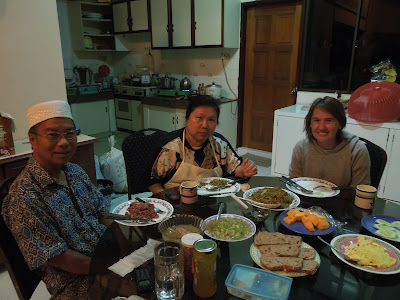3am:
Awake. Kitten No. 1 just bit my nose, but I think that was about 5 seconds after I actually woke up - something is being heavily and noisily pounded in the kitchen.
3:15am:
Lungkiam phones: breakfast is almost ready if I want to join them in the main house. I rub the sleep from the corners of my eyes, throw on a jumper and stumble out of my flat. "Oh, I do hope I didn't wake you with the kitchen pounding," she says, but I'm pleased she remembered I'm fasting today and has invited me to join them.
3:30am:
Breakfast is on the table, and Dr Othman comes down to join us. He's dressed for breakfast and prayers in a sarong (before we all stole it, this was originally a Malay word meaning 'sheath') and kopiah - a traditional, round, white hat.

They thank Allah for everything, and then we can eat. Lungkiam is a master Dusun cook, but for this morning she has prepared a range of food from Western rye bread, to Malay fried noodles, to Dusun
kampung vegetables, to plain-and-simple (and perfectly ripe) papaya from the garden.

There's also plenty of warm water to drink, and coffee - Othman won't be going back to bed, but is off to pray after eating. We sit and eat and talk. They are an interesting couple - Lungkiam converted to Islam in her teens so she could marry Othman; they moved to America to study for their PhDs; on returning to teach in Sabah in the 1970s, they were drawn into politics, with Othman entering parliament, and Lungkiam working with the Women's Division in the same party. Anyone who says that Muslim women are all oppressed needs to meet Lungkiam - a powerful, strong-minded, liberal woman who has more drive than most Western women I know. And Othman - well, he tells me for the second time of his glee at arriving at Heathrow at sundown one day, and giggles as he describes how wonderful the prayer room was - because every major religion was represented in the same room, with not even a fence to separate them. They are a wonderful pair who are truly becoming like family to me.
4:39am
We all gulp down the last of our water in the last minute before dawn officially arrives.
4:40am
Everything packed away, we say good night to each other and I return to my flat, where the kittens have celebrated a
suhoor of their own, chewing my pillow to shreds. I stand on the balcony for a few minutes and listen to the extended morning prayer wafting through the pale light from the nearby mosque. Then tiredness kicks in and I head back to bed for a couple of hours.
11am
I'm on my way to Kota Kinabalu. I'm not hungry in the slightest, but I
am thirsty. Very thirsty.
1pm
Driving through Kota Kinabalu city centre, I tut at a young American girl crossing the street, dressed in teeny-tiny shorts and waving a bottle of water at her friend. "Honestly, doesn't she know that some of us are trying to fast here?" I think the thirst is getting to me.
3pm
I stop for fuel on my way back to Ranau, and as I pay the cashier, I give in and ask for a small bottle of water as well. It's only 150ml, but it's a huge relief, and totally worth the guilt pangs.
6:15pm
Sitting on my balcony, I read to pass the time, anxiously watching the clouds over Mount Kinabalu turn from white to red to grey. There're other people in the common area of the homestay, mostly sitting and quietly talking. The Christian housekeeper is in the kitchen putting the final touches to the evening meal, but she's turned off her radio, and the air has a surreal calm to it. Everything holds its breath.
6:32pm
A prayer issues from the mosque. Lungkiam and Othman call me to join the other guests in breaking our fast with
iftar, the evening meal. This is normally begun with a date, but tonight we have deep-fried Sabah bananas instead, with fruit juice - which is fine with me, as my blood sugar has plunged from its regular 90%+ level :) The fruit juice tastes better than ever before, and everyone breathes out as they nibble cautiously on fritters, before taking the plunge with the enormous meal laid out for us. This breaking of the fast is a very communal time for Sabahans, who take turns to open their homes to other villagers to come and eat together. Any food left over will be taken to the mosque to feed those praying the evening prayers, and those less fortunate - who, again, will all eat together.
7pm:
My fast is broken, and although I didn't quite make it all the way through the day, I'm proud that I managed as much as I did. It gives me a new respect for my teachers who do this every day for a month, and still manage to teach their classes! And I take comfort in the fact that they have all had years of training - children as young as 5 or 6 will fast for half-days, while still drinking water if they feel the need.
Not too sure that I'll be doing it again though. That dried-out-throat feeling is just too off-putting!









